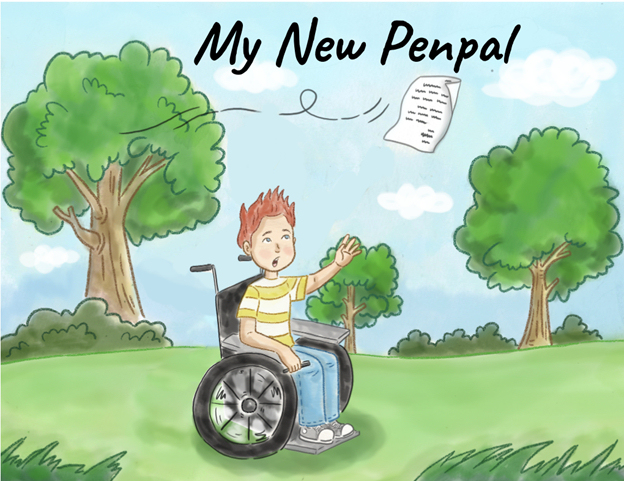
Help raise disability awareness for those that are experiencing feelings of loneliness and anxiety by supporting an engaging children’s book aimed at helping children feeling lonely find solace and comfort through a spontaneous penpal friendship.
The Book
Tommy was feeling down and lonely one day; he didn’t know who to talk to or how to describe his feelings, so he decided to write them down instead. His letter was taken from his hands by the wind, landing in the hands of Sally. She was delighted to find Tommy’s letter and decided to write him back, igniting the start of a new penpal friendship!
"My New Penpal" teaches young readers that they are never alone and always have someone to talk to or even write to, whichever their preference may be. With engaging rhymes, this picture book targets young readers and encourages them to open up about how they are feeling. It gives the children another tool to open up and connect with someone else that may be able to identify with the emotions that they are experiencing.
What Makes My Book Unique?
Prior to officially writing the story "My New PenPal," I conducted research to determine if there were any similar books in existence. I discovered that there were few books about penpal friendships in general, and none that linked a penpal friendship as a means to assist children with anxiety or any other disability. During my research, I also identified professional resources to help connect children with penpal friendships, especially those with disabilities, with which I resonate.
My story is not only unique, but it will also include professional resources linked in the back of the book for parents who have children wanting to participate in a penpal friendship, a lesson that parents or teachers can use with the book, as well as a universally designed penpal template for children to use (i.e., children can write, type, or use pictures to fill it out)!
The Author
My name is Morgan, and I am a school-based occupational therapist. I am a wife to a hardworking man who recently transitioned out of the Army, the mom to a beautiful baby girl, and a passionate occupational therapist working with students with disabilities. I have worked in several public schools across the country over the last 5 years, and I have had the privilege of working with students from all different backgrounds, diagnoses, and personalities.
I love reading with my daughter, Lyra. For being so young, she is so curious about every new children’s book I introduce. She has inspired me to follow my passion and write children’s books in hopes of one day seeing a book I have written sitting on her shelf. There is nothing more that I would want than to show her that if she is passionate about something, she should pursue it, and she can make anything possible.
The Research
There is a growing body of research that suggests that children with disabilities are at an increased risk for experiencing feelings of loneliness. Some statistics that support this claim include:
- According to a study published in the Journal of Developmental and Physical Disabilities, children with disabilities are two to three times more likely to report feelings of loneliness than their non-disabled peers.
- In a survey of over 500 parents of children with disabilities conducted by the National Organization on Disability, over 50% of parents reported that their child experienced loneliness and isolation.
- A study published in the Journal of Autism and Developmental Disorders found that children with autism spectrum disorder (ASD) experience higher levels of loneliness than their typically developing peers.
- In a survey of over 2,000 parents of children with special needs conducted by the National Parent Network on Disabilities, 75% of parents reported that their child had difficulty making friends.
- According to the World Health Organization, children with disabilities are more likely to experience discrimination and stigma, which can contribute to feelings of social isolation and loneliness.
These statistics suggest that children with disabilities are more likely to experience loneliness than their non-disabled peers, and that this may be due to a variety of factors, including difficulties with social interaction, discrimination, and stigma. It is important to provide support and resources for children with disabilities to help them build social connections and reduce feelings of loneliness.
The Kickstarter
In order to get this book from my computer to the bookshelves to so many children in hopes to help them understand that they are never alone, I need help! The upfront costs to initiate this project are beyond my capabilities. Whether it is simply sharing the news to others or considering backing the project yourself- you can help make a difference! Please visit my Kickstarter page to learn more about the project and touching the lives of children around the world!
https://www.kickstarter.com/projects/mynewpenpal/my-new-penpal?ref=1s0etl
